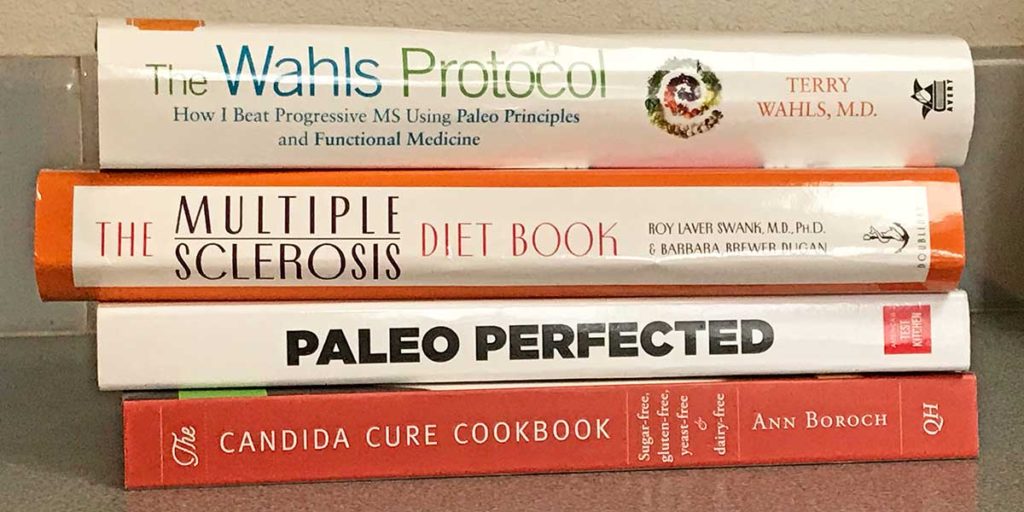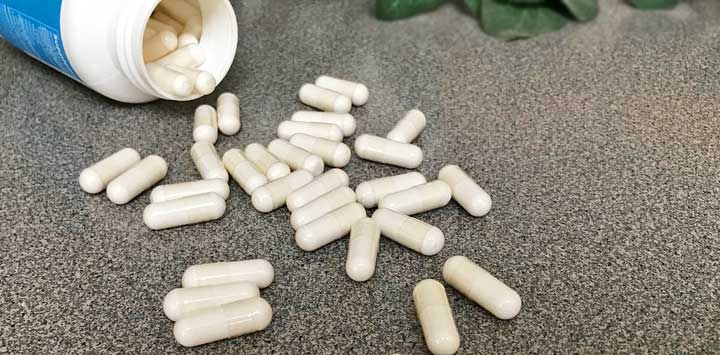
Being diagnosed with multiple sclerosis (MS) can be devastating and leave you feeling scared. – I know this from experience. There’s no cure for MS but since the cause is due to environmental factors you can do something about it.
Environmental factors that trigger MS:
- Poor Diet
- Infections (bacteria, parasites, viruses, and yeast overgrowth)
- Environmental toxins (heavy metals, mold, pesticides, etc.)
- Chronic stress
- Hormones (adrenaline, cortisol, vitamin D, etc.)
In 2004 I had a horrible MS flare that left me with double vision, half my face paralyzed, numbness, and unable to walk. It looked and felt like I had a stroke. I truly believed the MS medication I was on was causing me to have more flares with more severe symptoms. I knew there had to be something different.
With one eye closed, thanks to the double vision, I started searching the internet. That’s when I discovered people were managing their MS by eating a healthy diet.
Ever wondered how tweaking your diet and nutrition can actually make a difference in managing MS? The journey to heal is a lifestyle shift. Keep a positive mindset, along with good nutrition, mindful eating, regular exercise, and self-care – a holistic approach that goes beyond diet, nutrition, and MS.
Let’s talk about the incredible impact of embracing the trio – diet, nutrition, and well-being.
Best Diet for MS

There are many diets for MS but none are proven to help treat MS. I’ve been on many MS diets including the Swank, Best Bet, and Paleo diets. What I came to realize is, there is no perfect diet. Everyone is different and everyone reacts to food differently.
Don’t get me wrong, these diets have helped many people. If you find a diet that works for you go for it! The key is to adjust the diet to fit your needs. Although these diets are different there are some foods you need to avoid.
Foods to avoid:
- Dairy including whey, studies found dairy exacerbates MS symptoms
- Gluten creates inflammation
- Refined sugar, it’s linked to chronic diseases
- Artificial flavors and sweeteners, act as neurotoxins
- Natural flavors, are heavily processed and can contain chemical additives
- Corn, it’s mostly a GMO
- Soy, it’s mostly a GMO
- MSG harms the brain and central nervous system
- Nutritional yeast, it’s has MSG in it
- Canola oil (it’s mostly a GMO)
- Pork, it’s high in fat and prone to parasites
- Farmed fish, it’s washed in toxic chemicals due to parasites
- Processed citric acid, it’s mostly derived from corn
- Peanuts, a common allergen
- Eggs, both the McDougall Diet and The Wahls Protocol recommend avoiding eggs
The foods below are healthy but they don’t help the body detox. It’s best to avoid or rarely eat these to help your body heal quicker. You can add these back after your body has healed.
Foods to avoid temporarily:
- Beans
- Chickpeas
- Lentils
- Gluten-free grains like mullet and quinoa
What to Eat

Image by valuavitaly on Freepik
Aim for a healthy, balanced diet that gives you many nutrients so your body can heal. Eat mostly fruits, vegetables, herbs, and spices. Don’t be afraid to eat fruit. Fruit gives you antioxidants, fiber, minerals, phytonutrients, and vitamins. – Everything your body needs to heal.
Foods to include:
- Fruits
- Vegetables
- Herbs and spices
- Healthy oils
- Nuts and seeds
- Wild-caught fish
- Pasture-raised poultry (e.g. chicken, turkey, quail)
- Grass-fed and finished meats (e.g. beef, lamb, wild game)
A balanced diet along with a healthy lifestyle improves your overall health. It clears brain fog, gives you energy, improves your mood, and keeps your bones and muscles strong. It also cuts your risk of heart disease, osteoporosis, stroke, and certain cancers.
Beneficial Supplements

You should get most of your nutrients from food but it also helps to take some supplements. Studies found people with MS are often nutrient deficient, supplements can help. Plus, they fight pathogens like EBV.
Vitamin D is actually a hormone. It’s found in some food but we get it mostly from the sun. Most people with MS are deficient, talk to your doctor about getting tested. You can also use an online lab such as Walk-In Lab, I found it to be less expensive than going through my doctor.
To learn more about vitamin D read Multiple Sclerosis And Vitamin D
Calcium is important for keeping bones strong, it also helps muscles to work properly. People with MS have a higher risk for osteoporosis which is a disease that weakens bones. Having MS and osteoporosis is a bad combination due to a higher risk of falling and fracturing bones.
It’s also found in a few foods like dairy. Since you should avoid dairy you may want to look into taking a calcium supplement. Talk to your doctor about what’s best for you.
Vitamin B12 is important for people with neurological disorders like MS. It plays an important role in the central nervous system and in healing myelin. Studies found vitamin B12 may help with MS, it’s also an important antiviral. A study released in 2022 stated Epstein-Barr virus (EBV) is the main cause of MS.
To learn more about the study of MS and EBV read: Epstein-Barr Virus Is The Leading Cause Of MS.
There are many supplements to choose from so it’s important to buy one from a reputable source. Please read the labels and make sure it’s free from unwanted ingredients such as alcohol and gluten.
Always talk to your doctor before starting any new supplement or vitamin. They can interfere with certain medications.
To see which supplements I’ve taken read: Supplements For MS.
Stay Hydrated

Image by Racool_studio on Freepik
Don’t forget to drink plenty of water throughout the day. Water carries nutrients to cells and helps flush out toxins. It lubricates joints, protects vital organs, and helps break down foods. Our body can live without food for a few days but it can’t live without water. Water is essential in order for your body to heal.
Dehydration leads to dizziness, constipation, fatigue, and headaches. If you have bladder issues drink smaller amounts at one time and avoid drinking one or two hours before bed. If needed track your water intake to make sure you drinking enough. Setting an alarm to remind yourself is also a good idea.
Aim for at least eight 8-ounce glasses each day. Herbal tea counts as part of your water intake. If you sleep 8 hours each night that leaves 16 hours during the day. So, first thing in the morning drink a glass of water then set a reminder every two hours to drink one glass of water.
Example of water intake:
Wake up at 6 am and drink one glass of water. Then set your alarm for 8, 10, 12, 2, 4, 6, and 8 pm. and drink a glass of water – you just drank eight glasses of water for the day!
More than Diet and Nutrition for MS

Image by senivpetro on Freepik
Healing your central nervous system is more than diet alone. The journey to heal is a lifestyle shift. Keep a positive mindset, along with good nutrition, mindful eating, regular exercise, and self-care – a holistic approach that goes beyond diet, nutrition, and MS.
It’s about having a positive mindset that nurtures not only your body but your overall quality of life. A healthy lifestyle includes good nutrition, mindful eating, regular exercise, and self-care all working together. It’s about finding joy in movement, savoring wholesome meals, and carving out moments for yourself amid life’s hustle.
The key to stopping the progression of MS and reversing your symptoms includes:
- Prioritizing nutrition
- Incorporating regular exercise
- Taking time for self-care
- Choosing a clean environment
- Handling stress effectively
It’s not just about diet when it comes to healing; your lifestyle also matters.

The Ultimate Guide to Surviving & Thriving with MS
Unlock the key to a vibrant life with multiple sclerosis by subscribing to my newsletter and gaining exclusive access to ‘The Ultimate Guide to Surviving & Thriving with MS.’ It’s packed with valuable information on natural management strategies and clean health lifestyle practices that you can start today.
Want to remember this health tip? Pin it to your Pinterest board!

Image by Racool_studio on Freepik
The Power of Diet and Nutrition for MS





